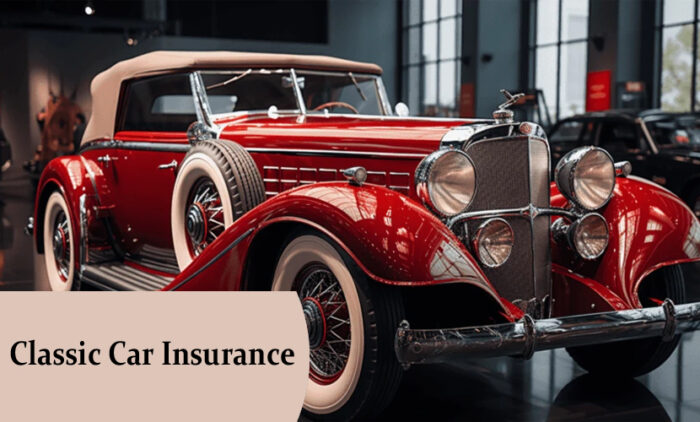Owning a vintage car, like a 1965 Ford Mustang or 1955 Chevrolet Cameo, requires the best classic car insurance for protection.

However, regular auto insurance may not adequately cover classic cars due to their appreciating value. Specialized classic car insurance is essential.
Insurers expect mileage from events like exhibitions, club activities, parades, shows, and occasional drives, accommodating unique usage.
For daily use of your classic car, consider standard insurance without mileage restrictions, as classic car policies typically limit usage.
For classic car owners, enthusiasts, or restorers, grasping classic car insurance details is vital to ensuring proper coverage for various uses. What is this insurance type all about and what does it cover? Read on to find out.
What Is A Classic Car?
Classic car insurance goes beyond covering vintage roadsters, antique pickup trucks, and muscle cars from bygone eras. The definition of a “classic car” varies among insurance providers and may include modern classics” and even replicas of classic cars.
Tailored for older vehicles primarily used for leisure rather than daily commuting, classic car insurance differs from standard car insurance.
While it shares some similarities, there are notable distinctions. However, it is often more cost-effective compared to standard policies, as insurers offer cost advantages for these vehicles.
This assumes that owners drive less and meticulously maintain their vehicles, reflecting lower-risk factors.
This acknowledgment of reduced usage and careful preservation contributes to the relatively lower premiums associated with car insurance type.
How Does Classic Car Insurance Work?
Classic cars inherently hold a higher value compared to everyday vehicles, and finding spare parts for these vintage automobiles can be challenging due to limited factory production. The repair or restoration of classic cars incurs significantly higher costs in the event of damage.
Rather than providing generic insurance, you and your insurer collaboratively establish an agreed value for your vehicle, essentially determining its worth. In the unfortunate event of an accident, the insurance company covers the agreed-upon amount (minus your deductible).
For example, consider owning a 1950 Oldsmobile 88. You and your insurer agree on a value of $35,000, with a chosen deductible of $1,000. In the event of total damage (an unfortunate event to avoid), you would pay the initial $1,000, and the insurer would cover the remaining $34,000.
How Much Is Classic Car Insurance?
This insurance type is cost-effective primarily because of the limited road use, reducing accident risks when compared to standard insurance for daily drivers.
Nevertheless, American Collectors and Heacock offer classic car rates up to 40% less than standard insurance, and Hagerty claims an average 34% reduction.
To determine your classic car insurance cost accurately, it’s advisable to collect quotes from various insurers.
Prices can vary considerably as insurers assess risk factors differently, and obtaining multiple quotes allows for more tailored and precise pricing.
What Types Of Cars Are Covered By Classic Car Insurance?
This type of insurance extends its coverage to a diverse range of vehicles, and eligibility criteria may differ among insurance providers. Here are examples of the types of vehicles that could meet the criteria for this insurance policy:
- Antiques
- Classic cars, military vehicles, and tractors
- Customs
- Exotics
- Kit cars and replicas
- Modified vehicles, such as hot rods, tuners, and low-riders
- Motorcycles and scooters
- Muscle cars
- Race cars
- Vehicles in the process of restoration
- Retired commercial vehicles, like fire trucks
- Trucks
- Collector vehicles from 1980 and onwards
Insurance providers offer coverage for a diverse array of vehicles under the umbrella of this insurance type. The eligibility for this type of insurance can vary among companies.
What Does Classic Car Insurance Cover?
This insurance type commonly provides coverage options comparable to those found in a standard personal auto insurance policy. These coverage types often include:
Liability Car Insurance
Classic car insurance usually incorporates liability coverage, addressing expenses for damage and injuries caused to others in an accident.
It also extends to cover legal defense expenses if you are sued due to an accident you caused. This type of coverage is mandatory in most states for vehicles driven on public roads.
Collision And Comprehensive Coverage
Classic car insurance often incorporates both collision and comprehensive coverage. These components cover various issues like car accidents, theft, vandalism, animal collisions, fire, flood, hail, falling objects, and riot-related incidents, safeguarding your vehicle.
This combined coverage is designed to provide financial protection for various scenarios that could affect your classic car.
Uninsured Motorist Coverage
Classic car insurance frequently incorporates uninsured motorist coverage, which covers your medical expenses in the event of an accident with an uninsured driver. Some states mandate the inclusion of uninsured motorist coverage in insurance policies.
In certain regions, this coverage may also extend to encompass damages to your car caused by an uninsured driver, acting as a financial safeguard in cases of accidents involving motorists without insurance.
Beyond standard coverage, classic car insurance provides customizable options such as salvaged salvage, spare parts, automotive tools, vehicles under construction, disabled vehicles, and automobile coverage.
This extended coverage ensures comprehensive and tailored protection for your classic vehicle.
How Can I Qualify for Classic Car Insurance?
This insurance covers vehicles over 10 to 15 years old or with historical or collectible value, providing specialized protection for such cars. To qualify for classic car insurance, you need to meet the following criteria:
Classification As A Classic
Your vehicle must be officially classified as a classic by the insurance company. Generally, this refers to cars that are over 25 years old, have undergone restoration or modification, and possess a substantial market value.
Secure Storage
When not in use, your classic car must be stored in a secure facility, such as a garage or locked shed. This precautionary measure is in place to safeguard your car from potential theft, vandalism, and damage caused by adverse weather conditions.
Low Annual Mileage
Classic car insurance often requires a low annual mileage, typically less than 5,000 miles per year. This indicates that your car is used for occasional drives, car shows, or exhibitions rather than for daily commuting or routine errands.
Good Driving Record
A prerequisite for this insurance policy is a commendable driving record, free of recent accidents, tickets, or claims.
This underscores your reputation as a responsible and safe driver, capable of caring for your classic car.
Separate Regular Transportation
You are typically required to have a separate car for your everyday transportation needs. This condition ensures your classic car isn’t used daily, securing proper coverage for your primary mode of transportation.
If you meet these requirements. Then you can apply for classic car insurance from various companies that specialize in this type of coverage.
Requirements To Apply For Classic Car Insurance
To apply for this insurance type, you need to meet certain requirements and find a suitable insurer that offers this type of coverage. Some of the requirements are:
- Your car must be classified as a classic by the insurance company, usually meaning that it is over 25 years old, has been restored or modified, and has a high market value.
- Your car must be stored in a secure facility, such as a garage or a locked shed, when not in use.
- Your car must have a low annual mileage, usually less than 5,000 miles per year, and you must have a separate car for your regular transportation needs.
- You must have a good driving record with no recent accidents, tickets, or claims.
How to Apply for Classic Car Insurance
There are different ways to apply, depending on your preference. They include:
Online
You can use the Finder tool to compare and enroll in a company online. However, you can explore insurers’ websites like American Collectors, American Modern, Leland-West, Chubb, Hagerty, and Heacock Classic for classic car coverage options.
Also, you will need to provide some personal information. They include; your car details, driving history, and address, to complete the online application.
By Phone
You can call the insurer directly and ask for an application form. You can find the insurer’s phone number and website by clicking on Plan Details on the Medicare Plan Finder tool or visiting the insurer’s website.
By Mail
You can request a paper application form from the insurer and mail it back to the insurer’s address. The insurer’s contact information can be accessed through the Medicare Plan Finder tool or their website.
However, before you apply for this insurance policy, you may want to review the insurer’s benefits, costs, and ratings and compare them with those of other insurers in your area.



